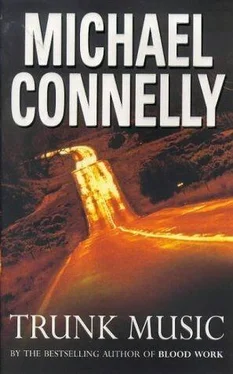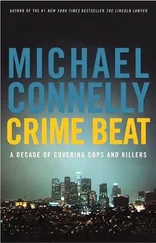She had come up to the counter now.
“He’s got to sign the receipt.”
“I don’t care! I’ll handle it!”
Bosch went back to his desk and sat down. He stared dead-eyed at O’Grady while Billets dug through the box until she found the inventory list and receipt Edgar had prepared. She showed O’Grady where to sign and then told him to go.
“You better watch him,” he said to Billets as he picked the box up off the counter.
“You better watch yourself, Agent O’Grady. If I hear anything else about this little disagreement here, I’ll file a complaint against you for inciting it.”
“He’s the one who-”
“I don’t care. Understand? I don’t care. Now leave.”
“I’m leaving. But you watch your boy there. Keep him away from this.”
O’Grady pointed to the contents of the box. Billets didn’t answer. O’Grady picked the box up and made a move to step away from the counter but stopped and looked once more at Bosch.
“Hey, Bosch, by the way, I got a message from Roy.”
“Agent O’Grady, would you please leave!” Billets said angrily.
“What is it?” Bosch said.
“He just wanted to ask, who’s the meat now?”
With that he turned around and headed down the hall to the exit. Billets watched him until he was gone and then turned around and looked at Bosch with anger in her eyes.
“You just don’t know how to help yourself, do you?” she said. “Why don’t you grow up and quit these little pissing wars?”
She didn’t wait for his reply because he didn’t have one. She walked quickly back into her office and shut the door. She then closed the blinds over the interior window. Bosch leaned back with his hands laced behind his neck, looked up at the ceiling and exhaled loudly.
After the O’Grady incident Bosch almost immediately became busy with a walk-in case involving an armed robbery. At the time, the entire robbery crew was out on a carjacking that had involved a high-speed chase, and that meant Bosch, as the desk man, had to interview the walk-in victim and type up a report. The victim was a young Mexican boy whose job it was to stand on the corner of Hollywood Boulevard at Sierra Bonita and sell maps to the homes of movie stars up in the hills. At ten that morning, shortly after he had set up his plywood sign and begun waving down cars, an old American-made sedan had pulled up with a man driving and a woman in the passenger seat. After asking how much the maps cost and whether he had sold very many of them, the woman had pointed a gun at the boy and robbed him of thirty-eight dollars. He had come in to report the crime with his mother. As it turned out, he had sold only one map that day before the robbery, and nearly all of the money taken from him was his own-he had brought it with him to make change. His loss was about what he made for a whole day of standing on the corner and waving his arm like a windmill.
Because of the small take and sloppy method used by the robbers, Bosch immediately thought the suspects were a couple of hypes looking for a quick score to buy their next balloon of heroin. They had not even bothered to hide the car’s license plate, which the boy had spotted and memorized as they drove away.
After he was finished with the boy and his mother, he went to the teletype machine and put out a wanted on the car with a description of the suspects. He found when he did this that there was already a wanted out on the vehicle for its use in two prior robberies in the last week. A lot of good that did the kid who lost a day’s pay, Bosch thought. The robbers should have been picked up before they got to the boy. But this was the big city, not a perfect world. Disappointments like that didn’t stay long with Bosch.
By this time the squad room had pretty much cleared out for lunch. Bosch saw only Mary Cantu at the sex crimes table, probably working on the paper from that morning’s walk-in job.
Edgar and Rider were gone, apparently having decided it would be better to go separately to Musso’s. As Bosch got up to leave, he noticed that the blinds were still drawn over the window to the lieutenant’s office. Billets was still in there, he knew. He went to the homicide table and put the copy of the murder book into his briefcase and then went and knocked on her door. Before she could answer, he opened the door and stuck his head in.
“I’m going to go catch some lunch and then go downtown for the IAD thing. You won’t have anybody out on the counter.”
“Okay,” she said. “I’ll put Edgar or Rider up there after lunch. They’re just waiting around for a case, anyway.”
“Okay then, I’ll see you.”
“Uh, Harry?”
“Yes?”
“I’m sorry for what happened earlier. Not for what I said. I meant what I said, but I should have taken you in here and spoken to you. Doing it out there in front of the others was wrong. I apologize.”
“Don’t worry about it. Have a nice weekend.”
“You, too.”
“I’ll try, Lieutenant.”
“Grace.”
“Grace.”
Bosch got to Musso and Frank’s Restaurant on Hollywood Boulevard at exactly twelve-thirty and parked in the back. The restaurant was a Hollywood landmark, having been on the Boulevard since 1924. In its heyday it had been a popular destination for Hollywood’s elite. Fitzgerald and Faulkner held forth. Chaplin and Fairbanks once raced each other down Hollywood Boulevard on horseback, the loser having to pick up the dinner tab. The restaurant now subsisted mostly on its past glory and faded charm. Its red leather padded booths still filled every day for lunch and some of the waiters looked and moved as if they had been there long enough to have served Chaplin. The menu hadn’t changed in all the years Bosch had been eating there-this in a town where the hookers out on the Boulevard lasted longer than most restaurants.
Edgar and Rider were waiting in one of the prized round booths, and Bosch slid in after they were pointed out by the maître d’-he was apparently too old and tired to walk Bosch over himself. They were both drinking iced tea and Bosch decided to go along with that, though privately he lamented that they were in the place that made the best martini in the city. Only Rider was looking at the menu. She was new in the division and hadn’t been to Musso’s enough times to know what the best thing was to order for lunch.
“So what are we doing?” Edgar asked while she looked.
“We’ve got to start over,” Bosch said. “The Vegas stuff was all misdirection.”
Rider glanced over the top of the menu at Bosch.
“Kiz, put that down,” he said. “If you don’t get the chicken pot pie you’re making a mistake.”
She hesitated, nodded and put the menu aside.
“What do you mean, misdirection?” she asked.
“I mean whoever killed Tony wanted us to go that way. And they planted the gun out there to make sure we stayed out there. But they screwed up. They didn’t know the guy they planted the gun on was a fed who would have a bunch of other feds as an alibi. That was the screwup. Now, once I learned that our suspect was an agent, I thought Joey Marks and his people must have figured out he was a fed and set the whole thing up to taint him.”
“I still think that sounds good,” Edgar said.
“It does, or it did until last night,” Bosch said as an ancient waiter in a red coat came to the table.
“Three chicken pot pies,” Bosch said.
“Do you want something to drink?” the waiter asked.
Hell with it, Bosch decided.
“Yeah, I’ll have a martini, three olives. You can bring them some more iced tea. That’s it.”
The waiter nodded and slowly glided away without writing anything on his pad.
“Last night,” Bosch continued, “I learned from a source that Joey Marks did not know the man he thought was named Luke Goshen was a plant. He had no idea he was an informant, let alone an agent. In fact, once we picked Goshen up, Joey was engaged in a plan to try to find out whether Goshen was going to stand up or talk. This was because he had to decide whether to put a contract on him in the Metro jail.”
Читать дальше












